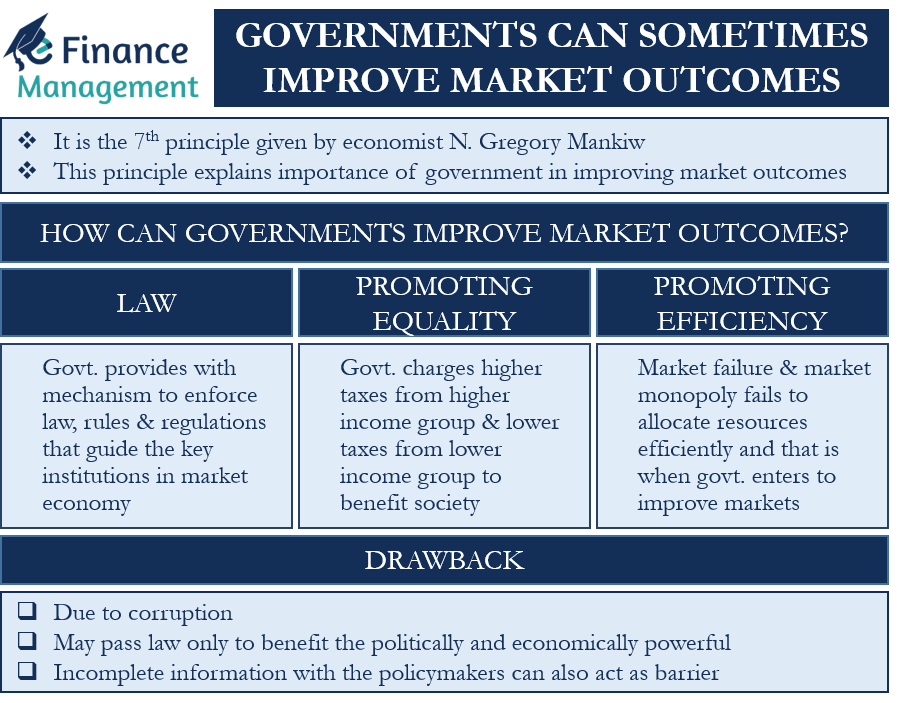What is “Governments Can Sometimes Improve Market Outcomes”?
Eminent economist N. Gregory Mankiw gave us ten principles of economics in his famous book ‘Principles of Economics”. The seventh principle of the ten principles is that governments can sometimes improve market outcomes. This principle explains to us the importance of government in improving market outcomes.
The sixth principle advocated promoting market economies over centrally planned economies. But this principle tells us that it is not that we don’t need the government at all. In fact, there are many instances when the government plays a crucial role in helping us to achieve market equilibrium.
How Can Governments Improve Market Outcomes?
The “invisible hands theory” propagated by the famous economist Adam Smith said that market outcomes are best when left free and without any control by the government. So do we not need the government in the economy? We definitely do.
A government provides us with the mechanism to enforce laws, rules, and regulations that guide the key institutions in a market economy. The government enforces “property rights” so that market participants know who legally owns a property, be it a piece of land, building, or automobile. The individuals accordingly put their properties and scarce resources to the best possible use. We need the government to act as the law-enforcing agency and protect our rights. For example, a cab driver will work only if he has an assurance that he has legal recourse to it in case his cab gets stolen. A shopkeeper will only function if he has an assurance that he will be paid for what he sells. A person will buy a piece of land only if he knows that his ownership rights will be protected. Therefore, we need the government to provide us with legal institutions in the economy.
Governments also act as interventionists in a free market economy. They change the resource allocation structure in the economy to promote efficiency or equality. By promoting efficiency, they intend to enlarge the overall economic pie. On the other hand, by promoting equality, they ensure that the pie is divided equally among all.
Promoting Efficiency
There are instances when the free markets fail to allocate resources efficiently on their own. We call such a situation “market failure.” There can be an externality or an external force that can disrupt the efficiency of the market. For example, excessive greenhouse gas emissions by a reckless production plant can cause severe damage to the environment. It can cause a significant increase in the temperature of Earth and bring about changes in its climate over a period of time. Free markets will not take any steps to control such emissions. But the government will.
The evolution of market power is the second cause of market failure. We usually call the market power a monopoly. A monopoly is a single firm or business that controls the trade or supply of any good or service. This gives it the power to control or influence the market prices of that product or service. For example, suppose an essential service such as electricity generation and distribution is in the hands of a single private player. In that case, it will have immense controlling power over the lives of the people. It can charge any amount it wants for its services because it is an essential service required by one and all. Governments frame public policies to control such market powers.
Promoting Equality
The “invisible hands” in an economy promote efficiency in resource utilization. But they do not promote economic equality. They do not propagate equitable distribution of income and wealth, which can result in severe economic inequalities within a society. Governments intervene repeatedly draft economic policies that work for the promotion of equality. For example, the government levies income tax on the incomes of the people. Moreover, people belonging to the higher income groups are taxed at a higher rate than the people belonging to the lower income group. This results in promoting economic equality in society and the overall well-being of the citizens in general.
Moreover, governments formulate policies to promote education in society. In the long run, this measure can help to provide suitable employment, alleviation of poverty, and promote equality in society. They bring in various schemes to provide employment to the economically weaker sections of society. This also helps in income generation and the promotion of economic equality.

Drawbacks: Governments Can Sometimes Improve Market Outcomes
It is not necessary that governments will surely improve market outcomes. Corruption in government offices can result in the improper implementation of government policies. The targeted beneficiaries of various policies may never actually receive their benefits. Often, the office bearers may pass laws that benefit the politically and economically powerful. Incomplete information with the policymakers can also act as a barrier to improving market outcomes.
Conclusion
Governments have controlling and authoritative power. Hence, they are in the driving seat and can definitely improve market outcomes. Right policies and measures, along with efficient policy-enforcing agencies, can go a long way in promoting efficiency and equality in the economy.

